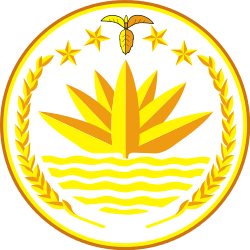Jumma people
The Jumma people (Bengali: জুম্ম জনগোষ্ঠী) is a collective term for the indigenous peoples of the Chittagong Hill Tracts region of present-day Bangladesh. They include the Chakma, Arakanese (Rakhine), Marma, Tripuri, Tanchangya, Chak, Pankho, Mru, Bawm, Lushai, Khyang, Gurkha, indigenous Assamese, Keot (Kaibarta), Santal, and Khumi.[1]
The name jumma ("jum farmer") is derived from jum cultivation, or slash-and-burn farming.[2] It is a reappropriated term originally used by outsiders.[3] They are also known as Pahari, which simply means "hill people".[4]
The Jummas are native people, unrelated to Bangla spoken by ethnic Bengalis. Religiously they are distinct as well, most being Buddhist, some Hindu and some are Christianized, with only a small number having converted to Islam. In addition, they have retained some traditional religious practices.[5]
Persecution by Bengalis
In 1971, following the Bangladesh Liberation War in which Bangladesh achieved independence, the country's majority Bengali Muslims began strategically colonising the Chittagong Hill Tracts (CHT), which has displaced the Jumma people.[6] Between 1978 and 1984, the government incentivised over 400,000 Bengali Muslims to settle in the CHT, by offering each family 5 acres of land and free food rations.[7] Between 1979 and 1997, Bengali Muslim settlers and the Bangladesh military carried out over 15 major massacres of Buddhist peoples in the CHT.[7] Due to the outbreaks of violence, communal and social unrest, many fled to the Indian states of Mizoram and Tripura, or to Burma (now Myanmar).[7] The Bangladesh government has also forcibly converted Marmas from Buddhism to Islam and destroyed Buddhist temples (kyaung), as means of integrating them into Bangladeshi society.[7] Amnesty International reports document systematic accounts of torture and extrajudicial executions of tribal inhabitants of the Chittagong Hill Tracts by security forces during 1989 and 1990.[8]
Human Rights Watch has consistently reported that "indigenous groups in the Chittagong Hill Tracts (CHT) have for decades faced discrimination, forced displacement, assaults, evictions, and destruction of property by both Bangladeshi security forces and Bengali settlers from the mainland.[9][10] Bengali settlers and soldiers have raped native Jumma (Chakma) women "with impunity" with the Bangladeshi security forces doing little to protect the Jummas and instead assisting the rapists and settlers.[11] In June 2017, Bengali rioters burned 100 indigenous homes in Langadu, reportedly even as army and police looked on.[12]
References
- ↑ Van Schendel, Willem (2001). Willem van Schendel, Erik J. Zurcher, ed. Identity Politics in Central Asia and the Muslim World. I.B.Tauris. p. 141. ISBN 978-1860642616.
- ↑ Roy, Rajkumari Chandra Kalindi (2000). Land Rights of the Indigenous Peoples of the Chittagong Hill Tracts. IWGIA. p. 28. ISBN 978-87-90730-29-1.
- ↑ Ghanea-Hercock, Nazila; Xanthaki, Alexandra; Thornberry, Patrick (2005). Minorities, Peoples and Self-determination. Martinus Nijhoff Publishers. p. 115. ISBN 90-04-14301-7.
It differentiates them from their plains neighbours and was initially used in a derogatory manner.
- ↑ International Labour Office (2000). Traditional occupations of indigenous and tribal peoples: Emerging trends. International Labour Organization. p. 78. ISBN 978-92-2-112258-6.
- ↑ Samaddar, Ranabir (2003-07-04). Refugees and the State: Practices of Asylum and Care in India. SAGE Publications. p. 251. ISBN 978-81-321-0377-6.
- ↑ "Ethnic violence in Bangladesh: assault on minority peoples continues - Asian Studies Association of Australia". Asian Studies Association of Australia. 2017-08-02. Retrieved 2018-09-18.
- 1 2 3 4 I, Fonkem Achankeng (2015-09-28). Nationalism and Intra-State Conflicts in the Postcolonial World. Lexington Books. ISBN 9781498500265.
- ↑ "Human rights violations in the Chittagong Hill Tracts: An update" (PDF). Amnesty International. 1991-09-13. Retrieved 2018-09-18.
- ↑ "World Report 2018: Rights Trends in Bangladesh". Human Rights Watch. 2017-12-14. Retrieved 2018-09-19.
- ↑ "World Report 2017: Rights Trends in Bangladesh". Human Rights Watch. 2017-01-12. Retrieved 2018-09-19.
- ↑ McEvoy, Mark (3 April 2014). "Chittagong Hill Tracts of Bangladesh – rapists act with impunity". Survival International - The movement for tribal peoples.
- ↑ "Longadu burning". The Daily Star. 2017-06-09. Retrieved 2018-09-19.
